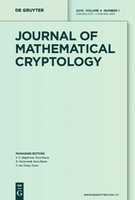
Journal of Mathematical Cryptology
Scope & Guideline
Illuminating the Path to Secure Information through Mathematical Rigor
Introduction
Aims and Scopes
- Mathematical Foundations of Cryptography:
The journal emphasizes the development and analysis of mathematical theories that underpin cryptographic protocols, including number theory, algebra, and combinatorics. - Cryptanalysis Techniques:
A significant focus is placed on the cryptanalysis of existing cryptographic schemes, assessing their security through various mathematical methods and providing insights into potential vulnerabilities. - Post-Quantum Cryptography:
With the rise of quantum computing, the journal has a strong emphasis on research related to post-quantum cryptographic systems, addressing the need for secure algorithms against quantum attacks. - Algorithmic Approaches:
Research often includes algorithmic developments for cryptographic applications, such as efficient key exchange protocols, signature schemes, and encryption methods. - Applications of Advanced Mathematical Concepts:
The journal explores the application of advanced mathematical concepts, such as lattice theory, elliptic curves, and tropical geometry, in the design and analysis of cryptographic systems.
Trending and Emerging
- Post-Quantum Security:
There is a marked increase in research focusing on post-quantum cryptographic algorithms and protocols, addressing the imminent threats posed by quantum computing to existing cryptographic systems. - Advanced Cryptanalysis Methods:
Recent publications have showcased innovative cryptanalysis techniques, including the use of machine learning and advanced algebraic methods to evaluate the security of cryptographic primitives. - Integration of Algebraic Structures:
Emerging research often integrates complex algebraic structures, such as isogenies and lattices, into cryptographic protocols, reflecting a trend towards more mathematically sophisticated approaches. - Privacy-Preserving Protocols:
A growing interest in privacy-preserving cryptographic schemes, such as secure multi-party computation and homomorphic encryption, indicates a shift towards protecting user data in cryptographic applications. - Efficient Implementation Techniques:
There is an increasing focus on the efficiency of cryptographic implementations, with research dedicated to optimizing algorithms for practical deployment in various computational environments.
Declining or Waning
- Classical Cryptographic Protocols:
Research on traditional cryptographic protocols, such as RSA and ElGamal, has seen a decline as newer, more secure methods are developed, particularly in the context of post-quantum cryptography. - Low-Dimensional Cryptanalysis:
There has been less emphasis on cryptanalysis techniques that focus solely on low-dimensional or simple algebraic structures, as the field shifts towards more complex and robust systems. - Basic Boolean Function Analysis:
Although still relevant, the frequency of papers focused on basic properties of Boolean functions has decreased as researchers increasingly turn to more intricate applications involving these functions in cryptographic schemes.
Similar Journals

Cryptography
Bridging Theory and Practice in CybersecurityCryptography, an esteemed journal published by MDPI, focuses on the rapidly evolving fields of cryptography and information security, providing a platform for researchers and practitioners to share their findings and advancements. Since its inception in 2017, it has embraced an Open Access model, allowing unrestricted access to high-quality research articles, thereby fostering collaboration and innovation among academics globally. Based in Switzerland, this journal aims to cover a broad spectrum, from theoretical foundations to practical applications, contributing significantly to fields such as Applied Mathematics and Computer Science. Its impressive rankings in reputable databases like Scopus reflect its relevance and quality, holding a Q2 category in multiple disciplines, including Computational Theory and Mathematics and Computer Networks and Communications. With the continuous rise in importance of cybersecurity and data protection, Cryptography serves as a vital resource for professionals, students, and researchers dedicated to advancing knowledge in these critical areas.

Cryptography and Communications-Discrete-Structures Boolean Functions and Sequences
Advancing secure communications through discrete mathematics.Cryptography and Communications - Discrete Structures, Boolean Functions and Sequences is a distinguished journal published by Springer, focusing on the crucial intersections of cryptography, discrete mathematics, and communication systems. With a significant presence in the academic community since its inception in 2009, the journal has established a robust reputation, holding a Q1 ranking in Applied Mathematics and notable positions in other relevant categories, reflecting its impact in the field. Researchers and professionals will find this journal engaging as it rigorously explores the theoretical underpinnings and practical applications of boolean functions and sequences, essential for advancing secure communication protocols and efficient data processing. Despite not currently offering open access, the journal is highly regarded for its quality peer-reviewed articles, making it a vital resource for scholars aiming to contribute to or stay at the forefront of cryptographic research. Its continual publication through 2024 ensures an ongoing dialogue in this rapidly evolving field, enhancing understanding and innovation among its readership in the United States and beyond.
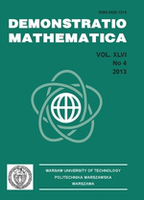
Demonstratio Mathematica
Elevating the Standards of Mathematical InquiryDemonstratio Mathematica, published by DE GRUYTER POLAND SP Z O O, is an esteemed open-access journal in the field of mathematics, with an ISSN of 0420-1213 and E-ISSN 2391-4661. Established in 1996 and providing open access since 2009, it has become a vital platform for disseminating innovative research and advancements in various areas of mathematics. With a commendable Scopus ranking of 85/399 in General Mathematics and a 2023 Category Quartile of Q2, it stands at the forefront of the mathematical community, demonstrating a significant impact within the top 78th percentile. The journal aims to foster a deeper understanding and appreciation of mathematical concepts and their applications, catering to both seasoned researchers and emerging scholars. Located in Warsaw, Poland, Demonstratio Mathematica not only enriches the academic discourse but also strengthens collaborative efforts within the international mathematics community, making it an essential resource for those seeking to expand their knowledge and research output.

IACR Transactions on Symmetric Cryptology
Pioneering Innovative Solutions in Secure CommunicationIACR Transactions on Symmetric Cryptology, published by the esteemed RUHR-UNIV BOCHUM at the Horst Gortz Institute for IT Security, stands as a beacon of innovation in the field of cryptology. With an E-ISSN of 2519-173X and a commitment to open access since 2016, this journal provides a platform for groundbreaking research that enhances our understanding and application of symmetric cryptographic methods. Reflecting its high academic standing, the journal boasts a Q1 ranking in categories such as Applied Mathematics, Computational Mathematics, and Computer Science Applications, positioning it among the top tiers of scholarly publications internationally. Researchers, professionals, and students are encouraged to contribute and access vital cutting-edge studies that inform both theoretical and practical advances in secure communication technologies. Situated in Bochum, Germany, the IACR Transactions on Symmetric Cryptology is an essential resource for anyone invested in the future of cryptographic research.

JSIAM Letters
Elevating Mathematical Techniques for Real-World ImpactJSIAM Letters, with ISSN 1883-0609 and E-ISSN 1883-0617, is an esteemed journal published by the Japan Society of Industrial and Applied Mathematics (JSIAM). Focusing on the latest advancements in the field of industrial and applied mathematics, this journal serves as a vital platform for researchers, professionals, and students to disseminate their findings and exchange innovative ideas. Although it currently does not offer Open Access options, JSIAM Letters maintains a strong reputation for high-quality, peer-reviewed articles that contribute to the growth and application of mathematical techniques in various industrial contexts. With a commitment to fostering collaboration within the mathematical community, JSIAM Letters plays a crucial role in bridging the gap between theoretical research and practical application, making it indispensable for anyone interested in the intersection of math and industry.

Rad Hrvatske Akademije Znanosti i Umjetnosti-Matematicke Znanosti
Connecting Scholars through Mathematical ExcellenceRad Hrvatske Akademije Znanosti i Umjetnosti-Matematicke Znanosti is a distinguished journal published by the Croatian Academy of Sciences and Arts, focusing on the vast domain of mathematics and its multifaceted applications. Established in Croatia, this journal serves as a vital platform for scholars and practitioners to disseminate innovative and significant research findings in mathematical science. With an ISSN of 1849-2215, it has been indexed in Scopus, achieving a notable Q3 ranking in the miscellaneous category of mathematics, which reflects its influence and reach within the academic community. While currently not classified as an open-access journal, it endeavors to offer accessible insights and foster collaboration among researchers, professionals, and students. Published annually, it spans diverse topics critical to advancing mathematical understanding and promotes the exchange of ideas across international boundaries. Emphasizing quality, this journal contributes to the ongoing dialogue in the mathematical sciences, thereby strengthening academic ties and enhancing knowledge dissemination.
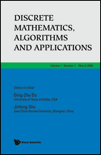
Discrete Mathematics Algorithms and Applications
Unraveling the Complexities of Algorithms and Applications.Discrete Mathematics Algorithms and Applications, published by World Scientific Publishing Co Pte Ltd, stands as a pivotal resource in the field of discrete mathematics and combinatorics since its inception in 2009, with a convergence period extending to 2024. The journal holds an esteemed position within its category, ranked in the Q3 quartile according to latest metrics, recognized for its qualitative contributions to the academic community. With an ISSN of 1793-8309 and an E-ISSN of 1793-8317, it serves as a vital conduit for disseminating innovative research focused on algorithms and their applications within discrete mathematics. Although currently not an open access journal, it provides access to valuable insights and findings that are crucial for researchers, professionals, and students seeking to advance their understanding and application of discrete mathematical concepts. Based in Singapore, the journal continues to promote rigorous scholarly discourse and is a key publication for those involved in advancing the discipline.
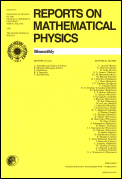
REPORTS ON MATHEMATICAL PHYSICS
Advancing Insights in Mathematical PhysicsREPORTS ON MATHEMATICAL PHYSICS is a distinguished journal published by PERGAMON-ELSEVIER SCIENCE LTD, focusing on the intricate interplay between mathematics and physics. Established in the United Kingdom, this journal has been contributing to the academic community since its inception, publishing significant research findings that explore the theoretical underpinnings of physical phenomena. With an ISSN of 0034-4877 and an E-ISSN of 1879-0674, the journal maintains a consistent publishing history, converging research from 1970 to 2024. It is currently ranked Q3 in both Mathematical Physics and Statistical and Nonlinear Physics categories, reflecting its commitment to maintaining a high standard of scholarly work. Although it lacks Open Access options, its targeted audience of researchers, professionals, and students will find invaluable insights into advanced mathematical methods, statistical applications, and innovative approaches in physics. With its esteemed reputation and critical role in the field, REPORTS ON MATHEMATICAL PHYSICS continues to be an essential resource for those seeking to deepen their understanding of mathematical applications in physical systems.
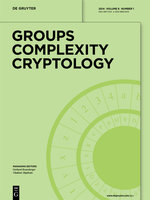
Groups Complexity Cryptology
Innovating Cryptographic Solutions Through Collaborative ResearchGroups Complexity Cryptology, published by EPISCIENCES, is an esteemed Open Access journal that has been contributing to the fields of Applied Mathematics, Computational Mathematics, Computational Theory, and Computer Networks and Communications since its inception in 2009. With its headquarters located in France, this journal serves as a crucial platform for disseminating innovative research and solutions in cryptology and related areas. As of 2023, it proudly holds Q4 rankings across several categories in Scopus, indicating its recognized, yet emerging position within the academic community. Additionally, it is indexed under various categories such as Applied Mathematics, where it ranks in the 24th percentile, showcasing its potential for growth and increased visibility among researchers. The journal adheres to an open-access model introduced in 2020, allowing for widespread accessibility and engagement with cutting-edge research. This enhances the journal's mission to foster academic communication and collaboration among researchers, professionals, and students interested in the complex interplay of groups, complexity, and cryptography.

International Journal of Computer Mathematics- Computer Systems Theory
Transforming Ideas into Mathematical SolutionsInternational Journal of Computer Mathematics - Computer Systems Theory, published by Taylor & Francis Ltd, is a vital resource in the fields of computational mathematics and computer systems theory. With an ISSN of 2379-9927 and E-ISSN 2379-9935, this journal has established a prominent presence in academia since its inception in 2016. It is categorized in the Q3 quartile for both Computational Mathematics and Computational Theory in 2023, reflecting its impact and contribution to the scholarly discourse within these domains. The journal’s Scopus rankings further emphasize its academic relevance, placing it in the 38th and 33rd percentiles in their respective categories. International Journal of Computer Mathematics aims to disseminate innovative research findings, methodologies, and theoretical advancements, making it an essential publication for researchers, professionals, and students looking to deepen their understanding of computational methods and applications. Although it currently does not offer open access, the journal continues to provide insightful contributions to the scientific community, fostering the evolution of computational sciences.